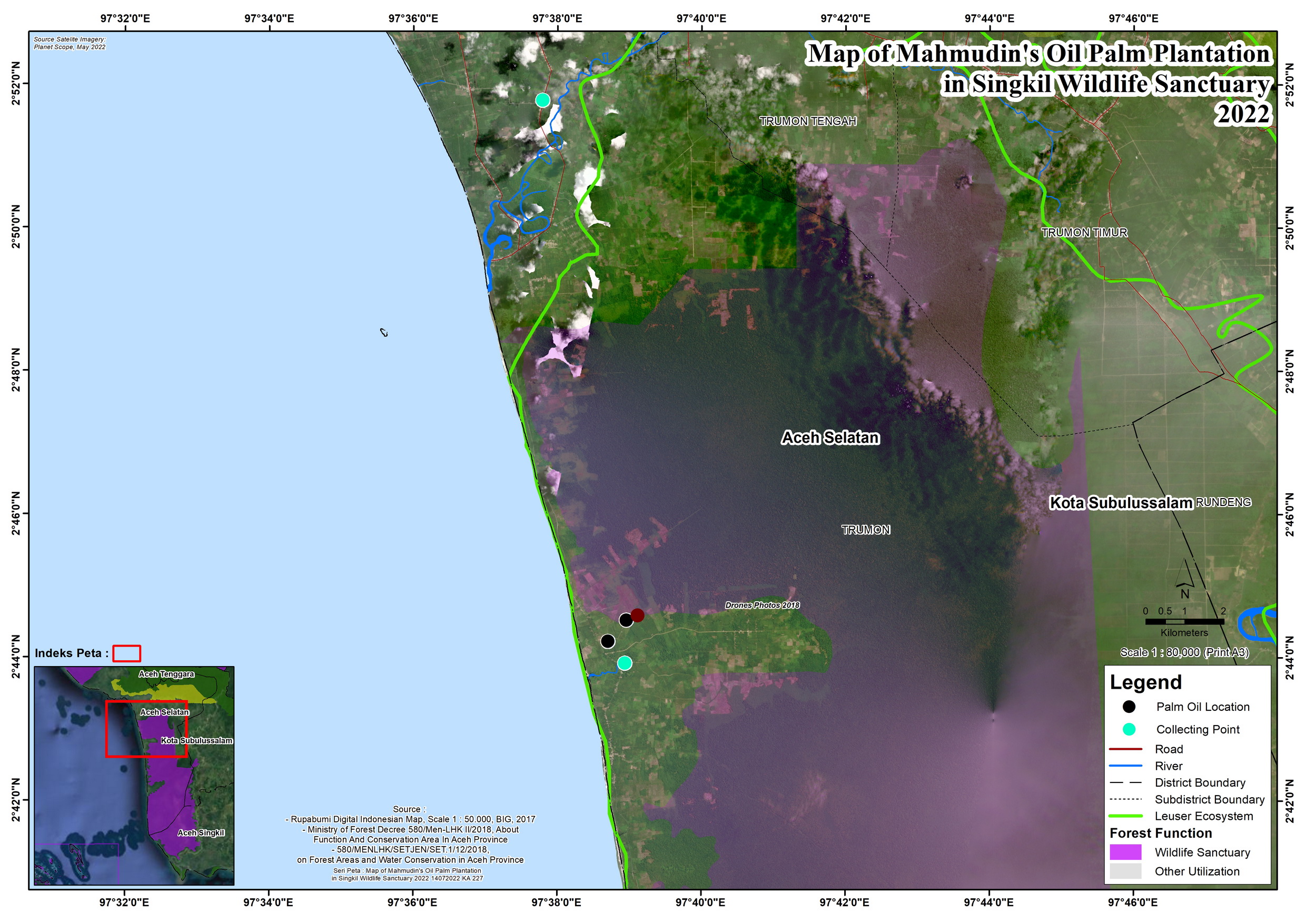RAN calls for urgent action by brands and investigations on suppliers’ illegal operations
Royal Golden Eagle Group and other palm oil traders that supply major brands like Procter & Gamble, Mondelēz, Nestlé, Unilever, PepsiCo and Nissin Foods have issued statements in response to RAN’s recent expose that deny their sourcing of illegal palm oil produced within the nationally protected Rawa Singkil Wildlife Reserve. RAN criticizes the investigations that have been conducted to date into one of the two “Carbon Bomb Scandal” cases as they have focused on verifying the legal, not illegal, plantations of their controversial supplier Mr Mahmudin. Mr Mahmudin is one of the two palm oil producers that RAN exposed for having expanded its plantation illegally into the protected wildlife reserve in the Singkil-Bengkung region of the Leuser Ecosystem in September this year.
RAN is calling for more action by brands, as not a single consumer goods company exposed in the report has issued a public response to the findings of illegal palm oil in their supply chains. This inaction is further evidence that the brands are failing to implement their “Forest Positive” and “No Deforestation, No Peatland and No Exploitation” (NDPE) commitments by stopping the expansion of new palm oil plantations in the threatened peat forests in the Leuser Ecosystem.
Major traders deny illegal palm oil production by their supplier Mr Mahmudin
Apical of the RGE Group, Musim Mas and Golden Agri Resources have all claimed that their supplier Mr Mahmudin has only supplied palm oil grown in its plantations located outside the Rawa Singkil Wildlife Reserve. Not a single trader has issued a response that includes the results of independent field investigations to determine if RAN’s findings are accurate––that Mr. Mahmudin has established illegal plantations inside the boundaries of the Rawa Singkil Wildlife Reserve in addition to its legal plantations that are located outside the nationally protected reserve. RAN stands by the evidence presented in the Carbon Bomb Scandals report and in response to these denials, RAN is presenting additional evidence below to support its findings that major brands and traders remain complicit with the destruction of the Rawa Singkil Wildlife Reserve for illegal palm oil plantations via their network of suppliers in the Singkil-Bengkung region in Aceh, Indonesia.
Mr Mahmudin has oil palm plantations located both inside and outside the Rawa Singkil Wildlife Reserve
RAN’s report presented evidence that Mr Mahmudin’s plantations include areas both within and outside the Rawa Singkil Wildlife Reserve. The map below––which was included in the report––shows that a vast area of forests have been cleared to the north of Mr Mahmudin’s legal plantations. RAN’s findings from our extensive field investigations is that Mr Mahmudin’s palm oil plantation extends to the north of the lands covered by his legal titles beyond the boundary of the Rawa Singkil Wildlife Reserve. The wildlife reserve area is shown by the pink shaded areas on the map below. High-quality images shown in three of the maps below show the destruction of peat forests by Mr Mahmudin. These images were taken at the location shown as a red dot in the map and the surrounding area cleared for palm oil.
Our field team found that this site, which was cleared in 2018, is now producing oil palm fruits and those fruits are being harvested and supplied to major brands by a number of brokers, mills and traders. RAN’s report also showed that Mr Mahmudin had plantation areas outside the wildlife reserve. Images that were presented in the report for locations within his legal plantations are shown in the map below via the black dots. The nearby collection point where oil palm fruit was taken is shown by the green dot which is outside the reserve.
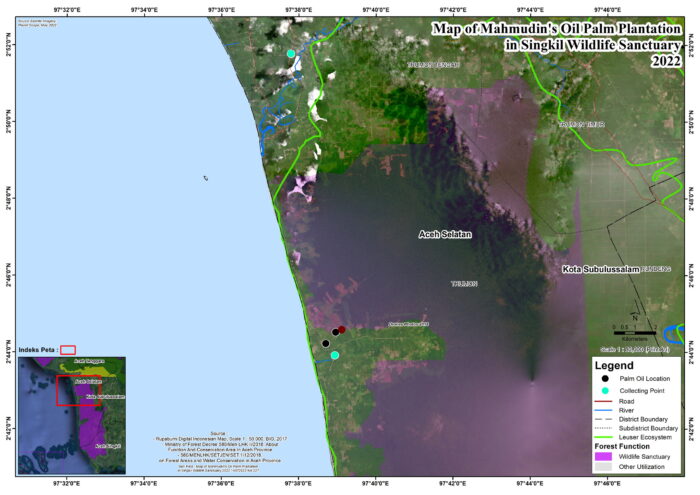
RAN’s report presented GPS coordinates that are both inside and outside the Rawa Singkil Wildlife Reserve. In order for field verification exercises to be credible they need to verify the location of Mr Mahmudin’s illegal plantations. To date, an investigation of the locations of the illegal plantations has not been undertaken by any mill, trader or brand exposed in the Carbon Bomb Scandals. These illegal palm oil sites are located within the boundaries of the Rawa Singkil Wildlife Reserve. Access to these areas is via a road that starts in Mr Mahmudin’s legal plantation that is outside the Rawa Singkil Wildlife Reserve. RAN also provided the GPS coordinates of this access road in our report (GPS Coordinate 02o44’52” N 97o38’96” E).
RAN has provided additional maps below to assist in field verification exercises that aim to visit the site of the destruction of peat forests which is now alleged by RAN to be the location of Mr Mahmudin’s illegal palm oil plantation. The maps below show the status of land cover at the location of the illegal plantations between 2017 and 2022.
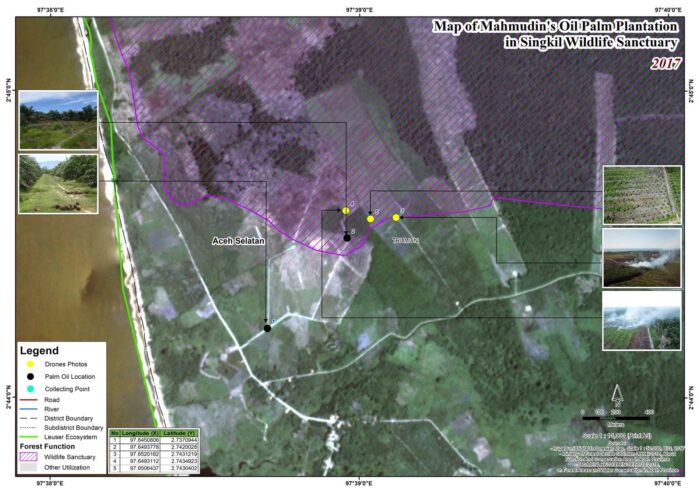
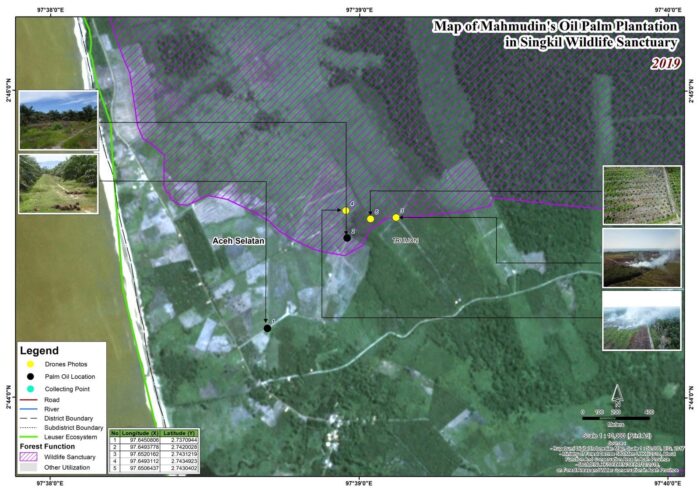
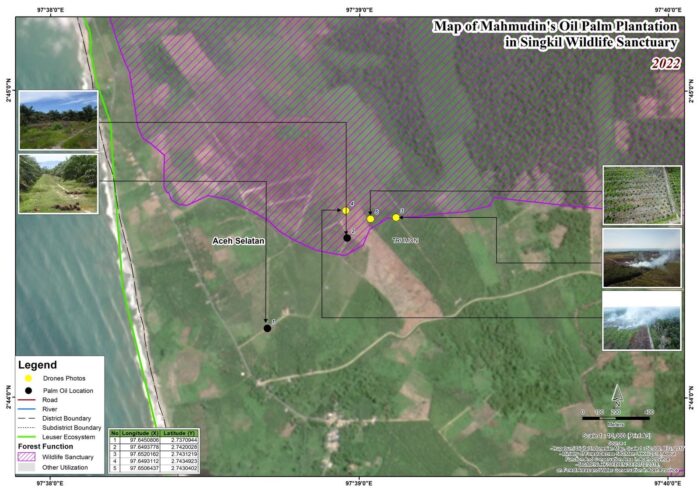
Oil palm from Mr Mahmudin’s illegal plantation inside Rawa Singkil Wildlife Reserve was harvested and transported to a collection point in Le Meudama
RAN’s report showed that Mr Mahmudin’s illegal palm oil plantations are bearing oil palm fruit and documents that fruits collected from the plantation are being transported to a nearby collection point in Le Meudama village. RAN’s field investigators followed the truck with the identification number BL9324 BS from the gateway of Mr Mahmudin’s plantation to the collection point in Le Meudama village. The following images show the truck en route to the collection point. Some additional images have been provided below to those included in the report with their respective GPS Coordinates.
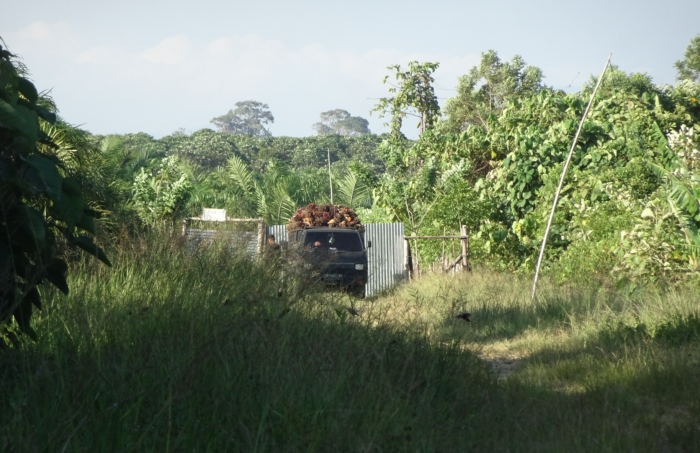
GPS Coordinates: 02o44’09.90” N 97o38’36.89” E
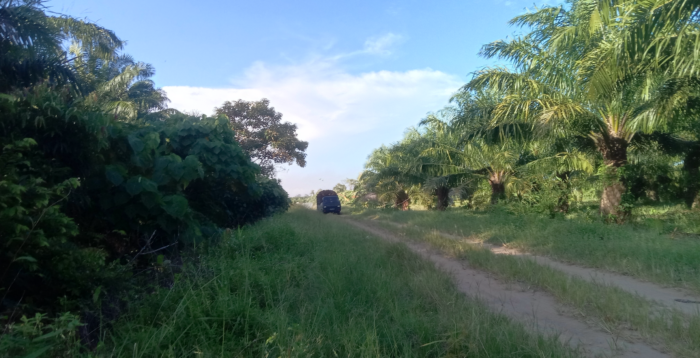
GPS Coordinates: 02o44’09.79” N 97o38’37.26” E
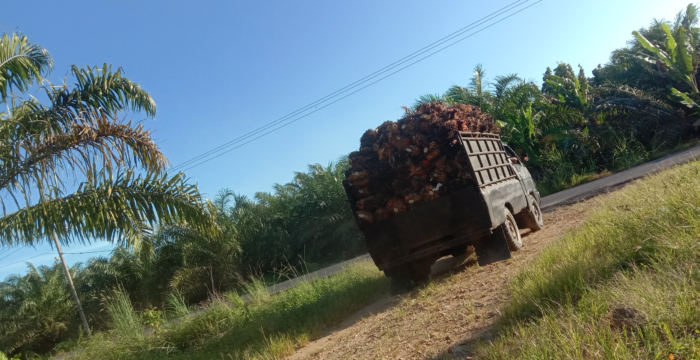
GPS Coordinates: 02o44’09.86” N 97o38’37.26” E
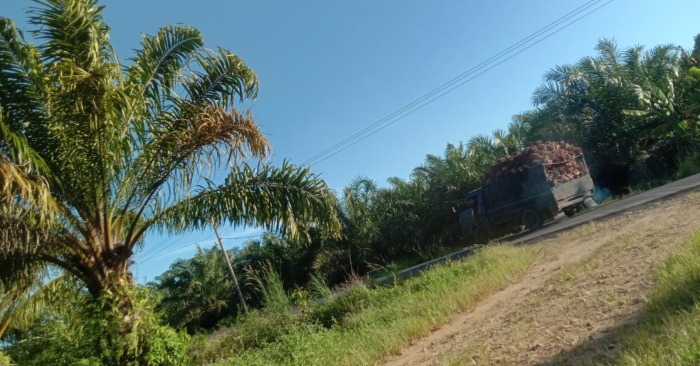
GPS Coordinates: 02o44’09.86” N 97o38’37.26” E
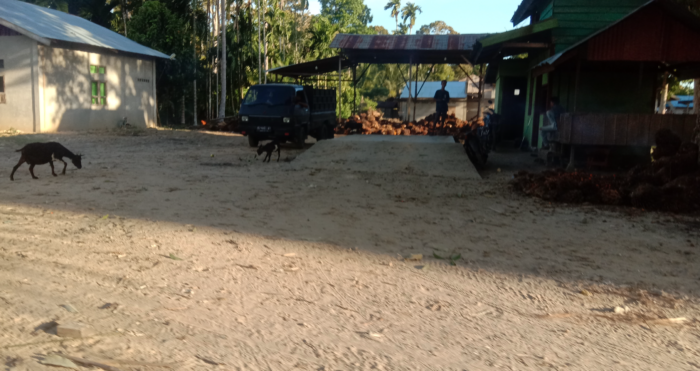
The truck arrives at the collection point the Le Meudama village the same afternoon. GPS Coordinates: 02o43’55.26” N 97o38’56.40” E
Purchase receipts obtained from workers at the collection point in the Le Meudama village show that brokers CV Natama Prima and CV Buana Indah both source from the collection point at the Le Maudama village which accepts palm oil fruits from Mr Mahmudin’s nearby legal and illegal plantations.
RAN’s field investigators interviewed workers at the collection point in the Le Meudama village. During interviews it was confirmed that two brokers CV Buana Indah and CV Natama Prima collected oil palm from this collection point and delivered the fruits to nearby Crude Palm Oil mills. Copies of purchase receipts were obtained that show that CV Buana Indah delivered oil palm fruits collected from this location to the mill PT. Runding Putra Persada and CV Navatama Prima delivered oil palm fruits collected from this location to the mill PT. Global Sawit Semesta (PT. GSS). A major flaw of these purchase receipts is they do not require brokers to list the location of the collection points or the location of all oil palm fruits collected. This opens up this so-called ‘traceability system’ to fraudulent claims such as the claims that have been made by the traders, mills, and CV Natama Prima that they have not received palm oil from this collection point.
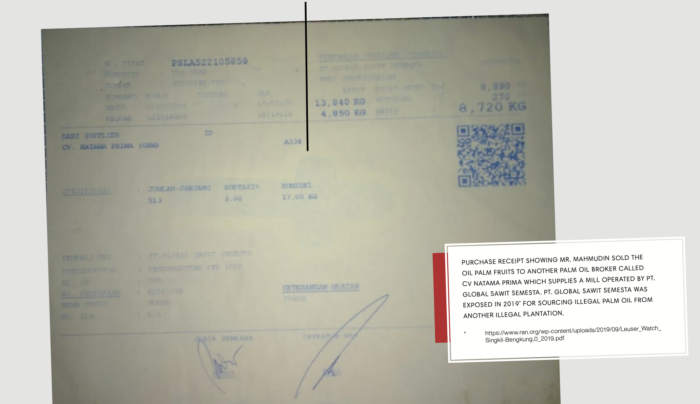
Receipt from RAN’s report showing the palm oil broker CV Navatama Prima collects oil palm fruits from Le Meudama village and delivers truck loads of palm oil fruits to PT. Global Sawit Semesta’s mill.
Mr Mahmudin operates at least two collection points––RAN’s report only alleged that one of these collection points at Le Meudama village was being supplied with palm oil produced at the expense of peat forests inside the Rawa Singkil Wildlife Reserve. PT. GSS claims that it only collected palm oil fruits from the second of Mr Mahmudin’s collection points that RAN named in its report–– the collection point that is located is to the north of the wildlife reserve in Singleng Village––and other plantation that is outside the wildlife reserve in Pulo Paya.
Royal Golden Eagle Group’s flawed investigation
RAN’s report alleged that the Royal Golden Eagle Group’s palm oil arm called Apical sourced palm oil from Mr Mahmudin’s illegal plantation via a palm oil mill called PT. Global Sawit Semesta, which was being supplied with oil palm fruits from a broker called CV. Natama Prima. These fruits were supplied via a collection point in Le Meudama village near the boundary of the Rawa Singkil Wildlife Reserve.
Apical’s response confirms that its supplier PT. Global Sawit Semesta is sourcing from the broker CV Natama Prima, but states that PT. GSS is only sourcing from one of Mr Mahmudin’s two collection points and from 3 estates ––all of which are located outside the Rawa Singkil Wildlife Reserve. Apical is relying on verification undertaken by PT. GSS, which claims that CV Natama Prima is not sourcing from the collection point in Le Meudama village––the collection point shown in RAN’s investigation (and above) to be accepting illegally produced palm oil. Apical has not undertaken any field verification to determine if the data submitted by CV Natama Prima or PT GSS is accurate.
Apical states that the receipt shown in RAN’s investigation does not form a valid basis to assume a FFB delivery was made to PT. GSS by CV Natama Prima––this is despite the fact that RAN secured the receipt from a worker at the collection point in Le Meudama village. The receipt obtained by our investigators was for deliveries made by the broker to the PT GSS mill around the time of the investigation. The only reason why this receipt did not list the location of the collection point is because Apical and other traders do not require the brokers in their supply chain to disclose the information on the name and GPS coordinates of the collection points where the FFB was picked up from in these receipts. There is also no requirement to list the GPS coordinates for all locations where oil palm fruits have been collected from for each delivery. The current system relies on self-reported collated data on supplying concessions and the location of villages where oil palm fruits are collected––a system which is clearly failing to stop illegally produced palm oil from entering supply chains.
Apical claims that PT. Runding Putra Persada (PT. RPP) and PT. Bangun Sempurna Lestari (PT. BSL) are not a supplier of PT. GSS. RAN did not claim that these crude palm oil mills are supplying PT. GSS as they are competitor mills. All three of these mills are named as they are sourcing from brokers being supplied with illegal palm oil produced inside the Rawa Singkil Wildlife Reserve.
Based on a limited desktop investigation, Apical has accepted PT. GSS’s claim that oil palm fruits from the collection point at Le Meudama village, where illegally produced palm oil fruits were collected, has not entered its supply chain. This is despite the evidence that RAN presented in its report, including receipts RAN obtained from the workers at the collection point which showed CV Natama Prima was one of at least two brokers being supplied by this collection point and was shown to be supplying PT. GSS’s crude palm oil mill. Apical has failed to appoint a third party to investigate the case of Mr Mahmudin’s illegal palm oil plantation further.
Sinar Mas Group’s flawed investigation
RAN’s report alleged that Sinar Mas Group’s palm oil arm called Golden Agri Resources (GAR) sourced palm oil from Mr Mahmudin’s illegal plantation via a supplier called PT. Runding Putra Persada which was supplied by a broker called CV. Buana Indah. GAR has issued a report that claims that Mr Mahmudin plantation only covers areas that are located outside the reserve and he has obtained individual land ownership (SHM) certificates from the National Land Agency (BPN) for all areas utilized. GAR states it conducted a spatial analysis but its analysis was limited to overlaying the areas covered by Mr Mahmudin’s land certificates. GAR has not presented any evidence in its report that it visited the locations of illegal plantations shown in RAN’s report to be located to the north of Mr Mahmudin’s legal plantation. GAR has also not verified the evidence in RAN’s report showing that the broker CV Buana Indah sourced oil palm fruit from the problematic collection point in the Le Meudama village––the collection point that received oil palm fruits grown in Mr Mahmudin’s illegal plantation.
Musim Mas’s investigation denies illegal palm oil production by Mr Mahmudin by verifying illegal palm oil sourcing from another supplier Ibu Nasti
Musim Mas has confirmed that its supplier PT. Global Sawit Semesta (PT. GSS) sourced palm oil from Mr Mahmudin from another broker called CV Natama Prima. Musim Mas also claims that its suppliers sourcing of palm oil is limited to palm oil produced in Mr Mahmudin’s legal plantations that are located outside the Rawa Singkil Wildlife Reserve––in areas that are a ‘different location from the coordinate stated in RAN’s report.’ Musim Mas cites verification undertaken by the mill PT. GSS in its response. To date, Musim Mas has not issued a commitment to undertake its own field investigation to determine if RAN’s findings on Mr Mahmudin’s illegal plantations are accurate and if the broker CV Natama Prima selling palm oil to its supplier has also sourced oil palm fruit from the problematic collection point in the Le Meudama village––the collection point that received oil palm fruits grown in Mr Mahmudin’s illegal plantation.
Musim Mas has responded to the second case of illegal palm oil entering its supply chain from a producer called Ibu Nasti. Musim Mas’s spatial analysis confirmed that part of Ibu Nasti’s oil palm plantation is located inside Rawa Singkil Wildlife Reserve. This finding is in contrast to a letter sent by Ibu Nasti and the Head of Kampong Binanga, Runding Village, that states her plantation is located between Pasar Runding village and Oboh Village and is not inside Rawa Singkil Wildlife Reserve. A verification process undertaken by PT. Bangun Sempurna Lestari (BSL)––the mill that sourced from Iby Nasti’s plantation––also confirmed, based on the coordinates in RAN’s report, that the location of Ibu Nasti’s plantation is not in line with the requirements to comply with the No Deforestation, No Peatland and No Exploitation policies of major traders and brands.
Despite denials, two of the three mills claim to have stopped sourcing from actors exposed for producing illegal palm oil
PT. Bangun Sempurna Lestari (BSL)––the mill caught sourcing from Ibu Nasti’s illegal plantation claims to have stopped sourcing oil palm from Ibu Nasti since 18 October 2022. Another mill, PT. Global Sawit Semesta, one of two mills RAN caught sourcing from Mr Mahmudin, claims to have stopped sourcing from Mr Mahmudin since October 2022.
The third mill exposed in our report, PT. Runding Putra Persada (PT. RPP) has not issued any statements that claim that it will stop sourcing from Mr Mahmudin. RAN’s assumption is that PT. RPP will persist in sourcing from Mr Mahmudin on the basis of its false claims that Mr Mahmudin doesn’t have illegal plantations located in the Rawa Singkil Wildlife Reserve.
Musim Mas and Apical both claim that PT. Global Sawit Semesta (PT. GSS) ceased sourcing from Mr Mahmudin in October but they do not say if they have placed Mr Mahmudin on their No-Buy list or if they are suspended sourcing from PT. GSS. This would be the second time Musim Mas suspended PT. Global Sawit Semesta for sourcing illegally produced palm oil from the Rawa Singkil Wildlife Reserve. GAR does not state that it has issued a No Buy policy for Mr Mahmudin and its supplier PT. RPP so we can only assume it is continuing to place its clients at risk of sourcing illegally produced palm oil.
A major question remaining is whether or not the No Buy policies of the mills on Mr Mahmudin and Ibu Nasti be enforced, given that mills in the region have failed to effectively address their sourcing of illegal palm oil grown in the protected reserve since RAN’s last published scandal in 2019.
Urgent action is needed from the brands exposed for sourcing illegal palm oil
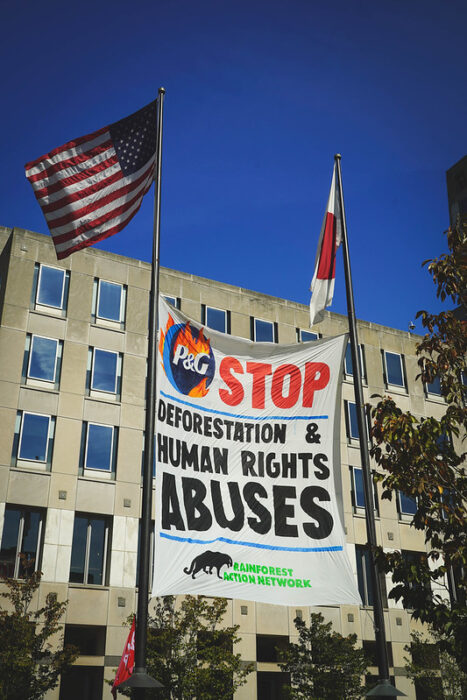
Deforestation for palm oil is on the rise in the Rawa Singkil Wildlife Reserve. Despite being hand delivered the Carbon Bomb Scandals report during a Consumer Goods Forum meeting at Climate Week in New York City––and at Procter & Gamble’s Annual General Meeting in Cincinnati, not a single brand exposed in the report has issued a public response to the findings of illegal palm oil in their supply chains. This inaction is further evidence that the brands are failing to implement their “Forest Positive” and “No Deforestation, No Peatland and No Exploitation” commitments by stopping the expansion of new palm oil plantations in the threatened peat forests in the Leuser Ecosystem.
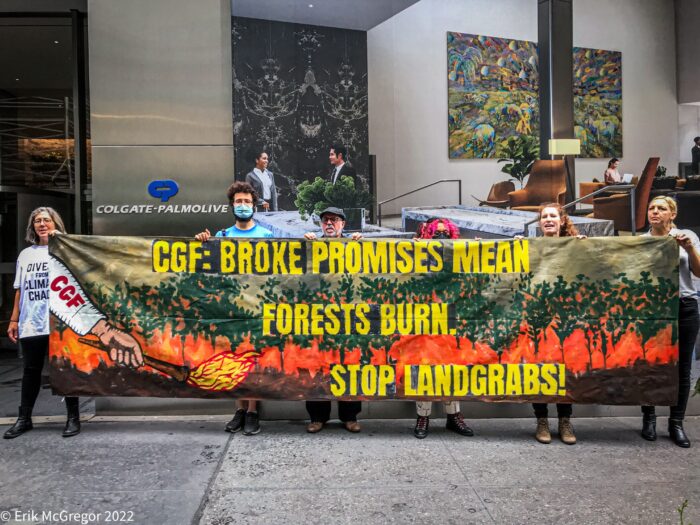
RAN is calling on brands to immediately stop sourcing from Mr. Mahmudin & Ibu Nasti’s illegal plantations in the Rawa Singkil Wildlife Reserve and the mills and refineries shown in our investigation to be sourcing illegal palm oil. Brands like Procter & Gamble, Mondelēz and Nissin Foods must issue public responses to this scandal and immediately take action to halt business-as-usual practices with their suppliers and not resume sourcing until transparent and verifiable monitoring, traceability and compliance systems are in place to protect the lowland rainforests and peatlands of the Singkil-Bengkung region from further destruction.
The greatest threat to the last remaining, irreplaceable and globally important lowland forests of the Leuser Ecosystem is death by a thousand cuts. Critically endangered Sumatran orangutans, tigers, elephants and rhinos depend on this landscape staying intact to avoid imminent extinction. Given current documented rates of illegal peatland destruction, there is no time left for delays as deforestation continues to rise in the Rawa Singkil Wildlife Reserve. In order to halt deforestation for illegal palm oil plantations, collaborative forest and peatland monitoring and response systems must be established that can enforce NDPE policies throughout supply chains all the way to the forest floor. Investments must also be made by brands and traders into long-term solutions that support both the protection and restoration of the Singkil-Bengkung region and the Rawa Singkil Wildlife Reserve.
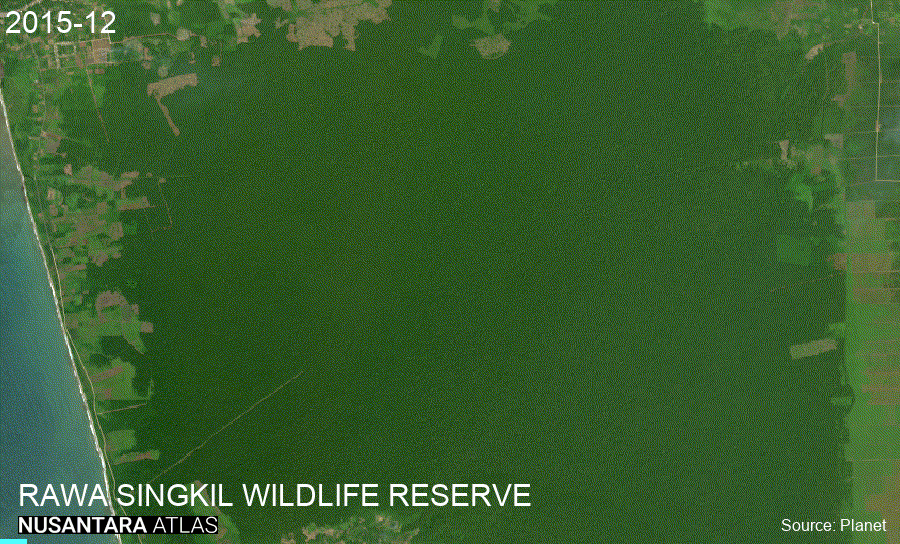
Forest loss in the Rawa Singkil Wildlife Reserve since the december 2015 cut off date for deforestation for palm oil in the ‘NDPE’ policies adopted by major brands. Credit: Nusantara Atlas using Planet satellite imagery.
